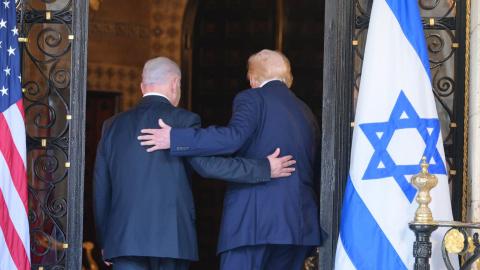Jerusalem's Shuk: Where Prophecy's Fulfilled
JERUSALEM, Israel -- Jerusalem's open-air market is one of the most colorful and popular spots in the city and a place where you can see prophecy fulfilled.
Mahane Yehuda -- the camp of Judah -- known as the "shuk" in Hebrew, is Jerusalem's most famous market, and like so many other places in the city, there's nothing ordinary about it.
Mahane Yehuda
The market begins along the historical Jaffa Road. About a mile and half down the road is the Jaffa Gate in Jerusalem's Old City.
In the late 1800s, a few brave Jews established homes in the area of the shuk, what was then a long way from the protection of the city walls.
"Today you would never even imagine such a thing, but when they moved out of the Old City, they were moving to these secured kind of neighborhoods, and that's why the name of the market is called Mahane Yehuda," tour guide Hannah Ben Haim told CBN News. "It's named after that neighborhood that was built in 1887."
Jaffa Road connects Jerusalem to the Mediterranean Sea port at Jaffa, considered by some to be the oldest harbor in the world.
"Who would have been on this road in recent history? Someone like General Allenby when he came and conquered this from the Ottoman's [in] 1917 [and] Theodore Herzl, the father of modern Zionism, came down this road," Ben Haim said.
"But when we think really old, really ancient, do you realize that the cedars from Lebanon, that were imported by [King] David and then [King] Solomon, they had to come from Jaffa into Jerusalem. Now, we don't know exactly the route they took, but this was the main artery," she said.
"It certainly hasn't disappeared off the face of the earth. It's had a transformation. Now it's a pedestrian mall with a beautiful European light rail going through it," she added.
Deep Symbolism
CBN's Scott Ross and his wife, Nedra, joined Ben Haim on a walk through the shuk on a busy Friday as shoppers prepared for the Sabbath.
"It's Shabbat, and we have to buy challah. Challah is the braided Shabbat bread and it comes in several different styles. One is sweeter than the other," Ben Haim told us.
"And traditionally you'd buy two of them because on the Friday when the children of Israel were in the desert, they always had a double portion," she added.
Many things in the shuk have a deeper symbolism for Israelis and Bible believers, like olives and olive oil.
"Of course the olive is part of the symbol of Israel. We have the menorah with the two abbreviated branches from Zachariah 4, 'Not by might, not by power,'" Ben Haim pointed out, noting that olive oil was burned in the menorah in the Temple.
Dozens of countries and cultures are represented in the shuk, brought here by Jews returning to the land from more than 100 countries.
An Iranian Jew started the Rosemary Spice Shop in Jerusalem in 1953 and later moved here to the shuk.
Today his grandsons still run the shop and grind and mix the spices themselves like their grandfather did. They sell mixtures that are good for rice, cheese, salads, or desserts.
"So that's three generations mixing spices and selling spices here in Jerusalem from Iran," Ben Haim said.
A Place to 'Remember'
An estimated 200,000 people visit the shuk each week. Rich and poor, young and old, religious and secular, as well as Jews and Arabs shop in the market. But it's had its share of tragedy, too.
In the center of the shuk a small plaque on the wall says "Remember" in Hebrew. It lists the names of 16 people.
On July 30, 1997, suicide bombers killed 16 people here and wounded almost 200. Terror attacks in the market virtually destroyed business so the municipality re-invented the shuk to make it one of the trendiest places in the city.
"How are we going to encourage people to come back here?" Ben Haim asked us. "So the new floors and the new ceilings even though it doesn't look very brand new to you, and also the openness to so many different other kinds of shops and restaurants, bistros, even night life is here."
"It's obviously been very successful," Ross noted.
"So you see all things work together for good. This tragedy brought new life," Ben Haim continued.
Seeing God at Work
More than 250 vendors sell everything from fruits and vegetables to gourmet cheeses, nuts, and special boutique items like flavored tahini and halva.
And some of the best restaurants in the city are here. The Azura Restaurant is in the Iraqi section of the shuk. It's been here for decades, having started in 1952.
It's a kosher meat restaurant serving traditional Turkish and Iraqi food. One of the restaurant's specialties is "azura," a cooked eggplant stuffed with ground beef, pine nuts, and cinnamon.
The Rosses agreed the food was delicious.
"Do you see why they've been here so long?" Ben Haim asked.
"It's so amazing the abundance of food that's here. I mean the tomatoes are [giant] like that and the variety of food piled up," Ross said.
"You know this was prophesied. Ezekiel prophesied, 'I'm going to give them such abundance.' Why is He giving us such abundance? So the nations will know what I'm [God is] doing. And here we are living and enjoying it today," Ben Haim said.
One religious Jew summed up the shuk for the Rosses this way: He said if you want to talk to God, go to the Western Wall; but if you want to see God at work go to the shuk.
And that's exactly what they saw.



